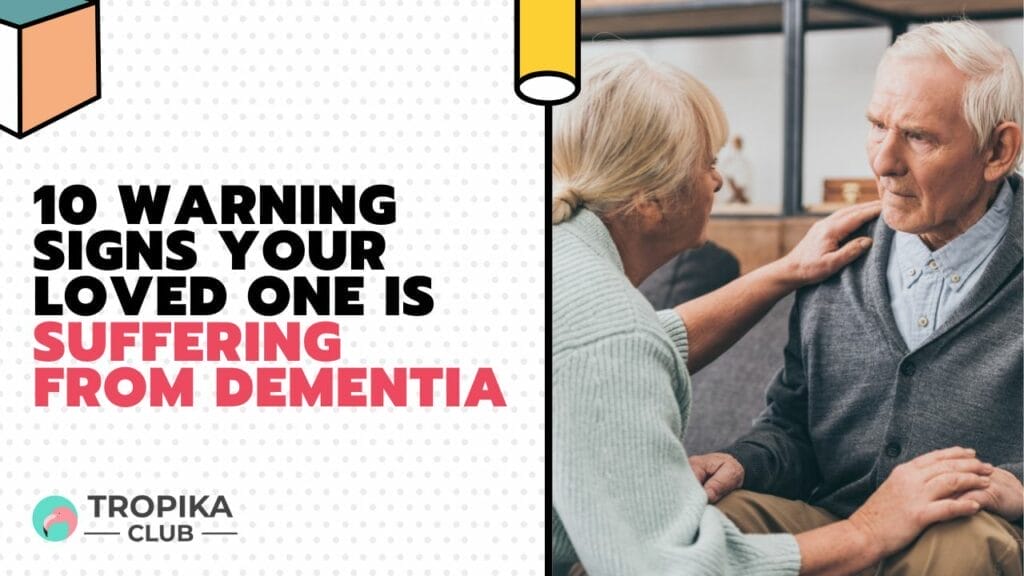10 Warning Signs Your Loved One is Suffering from Dementia

No Time to Read? Here’s a Snappy Summary of This Article
- Memory Loss: Forgetting recent events or repeating questions can signal early signs of dementia in loved ones.
- Disorientation: Getting lost in familiar places or confusion about time and location could indicate dementia onset.
- Difficulty Communicating: Struggling to find words or following conversations might hint at cognitive decline or dementia progression.
- Personality Changes: Noticeable shifts in behavior or mood, such as increased agitation or withdrawal, can accompany dementia.
- Neglecting Hygiene: Declining interest in personal grooming or neglecting cleanliness could be indicative of dementia-related challenges.
- Impaired Judgment: Making poor decisions or displaying impaired reasoning abilities may signify dementia-related cognitive decline.
Table of Contents
- No Time to Read? Here’s a Snappy Summary of This Article
- 1. Memory Loss Affecting Daily Activities
- 2. Difficulty Planning or Solving Problems
- 3. Difficulty Completing Familiar Tasks
- 4. Confusion with Time or Place
- 5. Trouble Understanding Visual Images and Spatial Relationships
- 6. New Problems with Words in Speaking or Writing
- 7. Misplacing Things and Losing the Ability to Retrace Steps
- 8. Decreased or Poor Judgment
- 9. Withdrawal from Work or Social Activities
- 10. Changes in Mood and Personality
- Meanwhile, Check Out Tropika Club’s Ecosystem of Websites
Introduction
In the fast-paced, bustling city of Singapore, where life moves at a breakneck speed, it’s easy to overlook subtle changes in our loved ones, especially the elderly. Dementia, a condition often shrouded in misconceptions and stigma, can creep in quietly, its subtle signs often unnoticed amidst the daily hustle and bustle. However, recognizing these early warning signs is crucial for ensuring timely care, support, and a dignified quality of life for those affected by this condition.
Dementia, a general term for memory loss and other cognitive impairments severe enough to interfere with daily life, is not a normal part of aging. It is caused by various underlying conditions that damage brain cells, leading to a decline in memory, thinking, language, and behavior. The progression of dementia can vary greatly from person to person, but early detection and intervention can significantly improve the quality of life for both the individual and their caregivers.

1. Memory Loss Affecting Daily Activities
Memory loss is often the first sign that a loved one may be experiencing cognitive decline. It can manifest in various ways, including forgetting recently learned information, such as appointments, phone numbers, or the names of familiar people or places. Repeatedly asking for the same information, even after it has been provided multiple times, is a common indicator of memory problems.
This type of memory loss, known as anterograde amnesia, affects the ability to form new memories. While individuals with anterograde amnesia may retain memories from their past, they may struggle to store new information in their long-term memory. This can make it difficult to learn new tasks, follow instructions, and engage in everyday activities.

2. Difficulty Planning or Solving Problems
Pay close attention to any changes in your spouse’s ability to plan and manage their daily tasks. This could manifest in a variety of ways, such as difficulty following a familiar recipe, keeping track of monthly bills, or managing their time effectively. These challenges may indicate underlying cognitive changes that could be a symptom of early-stage dementia or other neurological conditions.
Observe how your spouse handles routine tasks that they typically find easy. If they struggle to follow a simple recipe they’ve prepared countless times before, it could suggest a decline in their ability to process and retain information. Similarly, if they consistently forget to pay bills or make appointments, it could indicate a lapse in their organizational skills and memory.

3. Difficulty Completing Familiar Tasks
Pay attention if your loved one struggles with seemingly mundane tasks that they once handled effortlessly. These could be simple yet essential activities that form the bedrock of their daily routine. For instance, if they’ve consistently driven to their workplace for years but now encounter difficulty navigating familiar routes, it’s a cause for concern. Similarly, if they’ve always managed the grocery shopping but now struggle to organize a list or recall what items are needed, it suggests a decline in cognitive abilities. Likewise, if they’ve always enjoyed playing their favorite board game but now struggle to remember the rules or make strategic moves, it’s an indication of potential cognitive impairment.

4. Confusion with Time or Place
The loss of cognitive function can manifest in various ways, including difficulties with time perception, spatial awareness, and comprehension. Individuals experiencing these changes may find themselves struggling to keep track of dates, seasons, and the passage of time. They may lose track of the day or the year, or they may have difficulty understanding the significance of certain dates, such as anniversaries or birthdays. Their sense of time may become distorted, leading to confusion about mealtimes, appointments, and other routine activities.

5. Trouble Understanding Visual Images and Spatial Relationships
Vision problems can be a sign of dementia. This includes difficulty reading, judging distance, and determining color or contrast, which may cause problems with driving.

6. New Problems with Words in Speaking or Writing
They may struggle with vocabulary, have trouble following or joining a conversation, or repeatedly pause in the middle of a conversation, not sure how to continue.
_
Read Also:
10 Facts about Dementia that You Should Know
_

7. Misplacing Things and Losing the Ability to Retrace Steps
A person with dementia may put things in unusual places. They may lose things and be unable to go back over their steps to find them again, sometimes accusing others of stealing.

8. Decreased or Poor Judgment
Look for changes in judgment or decision-making, for example, in dealing with money or paying less attention to grooming and cleanliness. Increased vulnerability to scams or exploitation could be a sign of impaired judgment or a decline in cognitive abilities. They may fall prey to fraudulent schemes, make unwise financial decisions, or become easily persuaded by manipulative individuals. If your loved one, who was once financially responsible and prudent, starts making impulsive or risky financial decisions, it could be a sign of impaired judgment. They may engage in excessive spending, make questionable investments, or neglect their financial obligations. Noticeable changes in decision-making skills, such as making inappropriate choices in everyday situations, could be a red flag. They may make impulsive decisions without considering the consequences, forget important details, or struggle to follow directions.

9. Withdrawal from Work or Social Activities
A person with dementia may start to withdraw from hobbies, social activities, work projects, or sports. They may have trouble keeping up with a favorite team or activity.
:max_bytes(150000):strip_icc()/GettyImages-478008144-599a5a876f53ba001154a613.jpg)
10. Changes in Mood and Personality
They can become confused, suspicious, depressed, fearful, or anxious. They may be easily upset at home, at work, with friends, or in places where they are out of their comfort zone.
Conclusion
Recognizing the signs of dementia in a loved one can be a deeply unsettling experience. The gradual decline in cognitive abilities, the loss of independence, and the emotional toll on both the individual and their caregivers can be overwhelming. However, it is crucial to remember that early detection is paramount in managing dementia, especially in a country like Singapore where a comprehensive network of resources and support systems exists to help navigate this complex condition.
Early diagnosis allows for timely intervention, which can significantly improve the quality of life for both the person with dementia and their caregivers. By understanding the symptoms and seeking professional guidance, families can access invaluable support services, including personalized care plans, counseling, and respite care.
Moreover, early detection can facilitate informed decision-making regarding financial planning, legal matters, and long-term care arrangements. It empowers individuals with dementia to retain their autonomy and express their wishes while they still can do so.
While the journey with dementia may be challenging, early detection and intervention can make a significant difference in the lives of those affected. By acknowledging the signs, seeking professional help, and utilizing available resources, families can navigate this difficult path together with strength and resilience.

Frequently Asked Questions (FAQ)
Q: What are the early signs of dementia?
A: Early signs of dementia include memory loss, difficulty with familiar tasks, confusion with time or place, and changes in mood or personality.
Q: How can I differentiate between normal aging and dementia symptoms?
A: While forgetfulness can be a part of normal aging, dementia symptoms are more severe and persistent, affecting daily life and functioning.
Q: Is dementia only a concern for older adults?
A: While dementia is more common in older adults, it can also affect younger individuals, known as early-onset dementia, typically occurring in people under 65.
Q: Can dementia be prevented or cured?
A: There’s no known cure for dementia, but adopting a healthy lifestyle, staying mentally and socially active, and managing underlying health conditions can help reduce the risk.
Q: How do I approach discussing dementia with my loved one?
A: Approach the conversation with empathy, patience, and honesty, focusing on providing support and resources rather than overwhelming them with information.
Q: Where can I find support for caregivers of individuals with dementia in Singapore?
A: Caregivers in Singapore can access support through organizations like Alzheimer’s Disease Association (ADA) and Singapore Alzheimer’s Disease Association (SADA), offering resources, support groups, and professional guidance.

Have an Article to Suggest?
Tropika Club is always looking for new and exciting content to feature in their magazine and they value the input of our readers. If you have any noteworthy content or articles that you believe would be a great addition to Tropika Club’s magazine, we are open to suggestions and encourage you to reach out to us via email at [email protected]. By doing so, Tropika Club values your expertise and knowledge in the matter and appreciates your willingness to help. We will review your recommendations and update our list accordingly
Meanwhile, Check Out Tropika Club’s Ecosystem of Websites
Tropika Club Magazine – Tropika Club Magazine is a Singapore-based publication that features articles on a wide range of topics with a focus on local businesses and content for the region. The magazine emphasizes supporting local businesses through its #SupportLocal initiative, which includes coverage of everything from neighborhood hawker stalls to aesthetic clinics in town. In addition to highlighting local businesses, Tropika Club Magazine also covers a variety of local content, including beauty, lifestyle, places, eats, and what’s on in Singapore and the Asia Pacific region.



